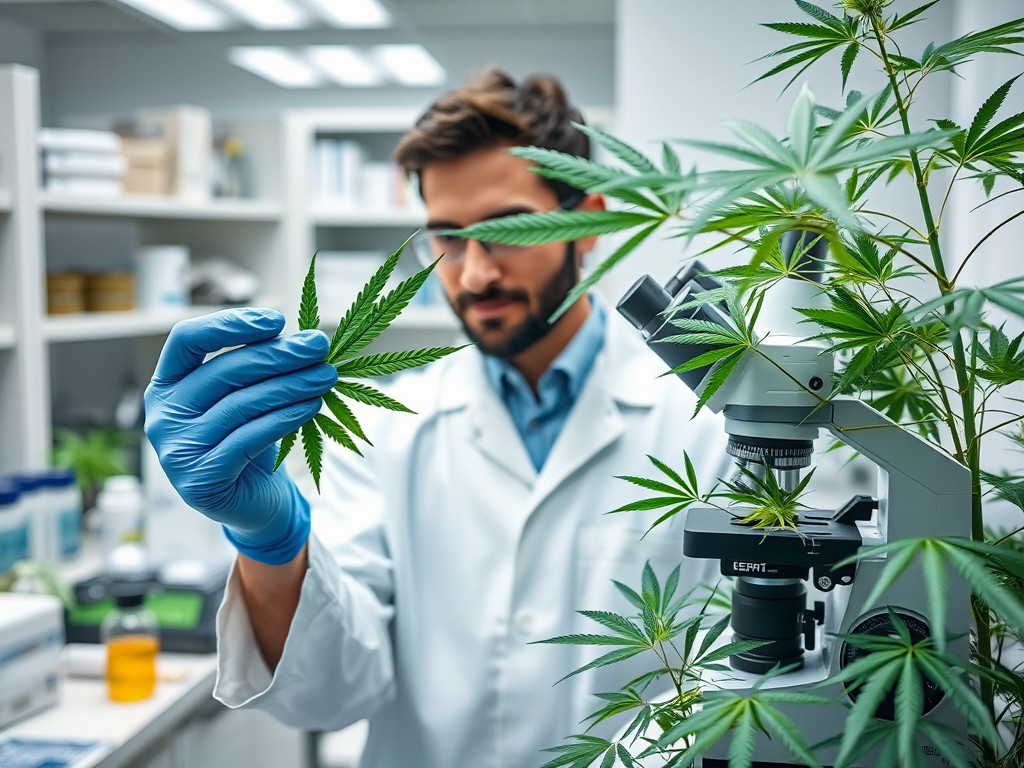Cannabis has emerged from the shadows of prohibition and stigma to become a widely discussed topic in both medical and recreational contexts. Once seen solely as a recreational drug, cannabis has gradually been recognized for its potential therapeutic benefits. From chronic pain relief to managing mental health conditions, its role in modern medicine has shifted significantly. This article aims to explore the therapeutic effects of cannabis, examining the scientific research, real-life anecdotes, and perspectives from healthcare experts, while answering common questions about its use and benefits.
1. Understanding Cannabis: A Brief Overview
What is cannabis? Cannabis is a plant that has been used for centuries for medicinal, recreational, and industrial purposes. The plant contains over 100 different compounds known as cannabinoids, with the most well-known being tetrahydrocannabinol (THC) and cannabidiol (CBD). These compounds interact with the body’s endocannabinoid system, a network of receptors involved in regulating a wide range of physiological processes.
Cannabis can be consumed in various forms, including smoking, vaping, oils, edibles, and capsules. The form of consumption often determines how quickly and intensely the therapeutic effects are felt.
2. What is Cannabis Used For?
What is cannabis used for? Cannabis is mainly utilized for medical and recreational uses. Medically, it has been found to help manage a variety of conditions, from chronic pain to neurological disorders. THC, the psychoactive compound in cannabis, is effective for pain relief and nausea reduction, while CBD is non-psychoactive and has gained attention for its potential benefits in treating anxiety, epilepsy, and inflammation.
Chronic Pain Relief
Perhaps the most commonly cited use of cannabis in medicine is for the relief of chronic pain. Studies have shown that cannabis, particularly THC, can alleviate pain by interacting with the brain’s pain receptors. A landmark study published in the Journal of Pain in 2011 found that cannabis-based medicines significantly reduced chronic pain in patients suffering from conditions like multiple sclerosis (MS), fibromyalgia, and arthritis.
One such patient, John, a 55-year-old man with severe osteoarthritis, found cannabis to be life-changing. “Before using cannabis, I experienced pain while walking. Now, I can move without constant discomfort,” he explains. For John, cannabis was a last resort after years of relying on painkillers that were either ineffective or carried dangerous side effects.
Mental Health Conditions
Cannabis is also gaining traction in the treatment of mental health conditions, including anxiety, depression, and post-traumatic stress disorder (PTSD). Research into the effects of CBD, in particular, has been promising. A 2015 review in Neurotherapeutics concluded that CBD has anxiolytic (anxiety-reducing) properties, which could be beneficial for patients suffering from anxiety disorders.
Anna, a 30-year-old woman with generalized anxiety disorder, shared her experience: “I tried traditional medications, but they left me feeling numb. CBD oil gave me relief without the foggy feeling. It helped me feel like myself again.”
Neurological Disorders
The therapeutic potential of cannabis extends to neurological disorders, including epilepsy and Parkinson’s disease. The most notable example is the use of CBD in the treatment of epilepsy. Epidiolex, a prescription CBD-based medication, has been approved by the U.S. Food and Drug Administration (FDA) for the treatment of rare and severe forms of epilepsy, such as Dravet syndrome and Lennox-Gastaut syndrome. Clinical trials have shown that Epidiolex can reduce the frequency and severity of seizures in children and adults.
Charlotte Figi, a young girl diagnosed with Dravet syndrome, became a symbol of hope for many families dealing with epilepsy. After her parents began using a CBD-rich cannabis extract to treat her seizures, Charlotte experienced a dramatic reduction in the frequency of her seizures, leading to increased awareness and acceptance of cannabis as a treatment for epilepsy.
3. The Science Behind Cannabis
Cannabis’s therapeutic effects are largely attributed to its interaction with the body’s endocannabinoid system (ECS). The ECS is responsible for regulating a variety of bodily functions, including mood, appetite, pain sensation, and immune response. The two main types of receptors in the ECS, CB1 and CB2, interact with cannabinoids to produce a range of physiological effects.
- THC binds primarily to CB1 receptors in the brain, producing the psychoactive effects commonly associated with cannabis use, such as euphoria and altered sensory perception. THC also has potent pain-relieving and anti-inflammatory properties, which contribute to its therapeutic effects in conditions like arthritis and MS.
- CBD, on the other hand, does not produce a “high” but interacts with both CB1 and CB2 receptors to modulate pain, inflammation, and anxiety. It has been shown to have neuroprotective properties and can help manage symptoms of conditions such as Parkinson’s disease, Huntington’s disease, and Alzheimer’s.
4. Does Cannabis Have Any Health Benefits?
Does cannabis have any health benefits? Yes, cannabis has a variety of potential health benefits, many of which are supported by scientific research. Beyond pain management, cannabis has been shown to help with sleep disorders, nausea (especially related to chemotherapy), muscle spasms, and even appetite stimulation in patients with conditions like HIV/AIDS.
Cannabis has also been recognized for its potential in reducing opioid use. Studies have indicated that patients using medical cannabis for pain management may be able to reduce or eliminate their use of opioid medications, which carry significant risks of addiction and overdose.
5. What Type of Drug is Cannabis?
What type of drug is cannabis? Cannabis is classified as a psychoactive substance, meaning it affects the brain and alters mood, consciousness, or perception. The drug contains compounds that can produce a variety of effects, including relaxation, euphoria, increased appetite, and altered sensory perception. While cannabis is often categorized as a recreational drug, its medicinal properties have sparked significant interest in its clinical use.
Cannabis is classified as a Schedule I controlled substance in some countries, meaning it is considered to have no medical value and a high potential for abuse. However, this classification has been challenged as more research and evidence emerge, and many countries and states have moved toward legalizing cannabis for both medical and recreational use.
6. How is Cannabis Taken?
How is cannabis taken? There are several methods of consuming cannabis, each with its own advantages and considerations. The most common methods include:
- Smoking: Smoking cannabis involves inhaling the smoke produced by burning the plant. This method allows for rapid absorption of cannabinoids into the bloodstream, resulting in almost immediate effects. However, smoking can be harmful to the lungs and is not recommended for individuals with respiratory issues.
- Vaping: Vaping cannabis involves heating the plant material or cannabis oil to a temperature that releases the cannabinoids without combusting the plant. This method is considered less harmful to the lungs than smoking.
- Edibles: Cannabis-infused edibles, such as gummies, chocolates, and beverages, are another popular method. Edibles take longer to produce effects because they must be digested and metabolized by the body. However, the effects last longer than with smoking or vaping.
- Oils and Tinctures: Cannabis oils and tinctures are concentrated forms of cannabis that can be taken orally or sublingually (under the tongue). These products offer precise dosing and are often used for managing conditions like pain, anxiety, and sleep disorders.
7. Is Cannabis a Depressant?
Is cannabis a depressant? Cannabis is not strictly classified as a depressant. It is a psychoactive drug that can have varying effects depending on the strain and cannabinoid content. While THC can produce relaxing or sedative effects in some users, it can also cause feelings of euphoria and heightened sensory awareness in others.
Cannabis is considered a versatile drug that can act as a stimulant, depressant, or hallucinogen, depending on the context and the individual. Some strains, known as « indicas, » tend to have more calming, sedative effects, while others, « sativas, » are more stimulating and energizing.
8. What Are Cannabis Pills?
What are cannabis pills? Cannabis pills are oral capsules that contain a dose of cannabis oil or extract. These pills are often used for medical purposes and are available in both THC and CBD formulations. Cannabis pills offer a convenient and discreet way to consume cannabis, particularly for individuals who do not want to smoke or vape. They are often used to treat conditions like chronic pain, insomnia, and anxiety.
9. Can You Smoke Cannabis Oil?
Can you smoke cannabis oil? While it is technically possible to vaporize cannabis oil, it is not recommended to smoke it in the traditional sense. Smoking cannabis oil can result in harmful chemicals being released into the lungs, potentially causing respiratory issues. If you want to use cannabis oil, it is best to vape it using a proper vaporizer or to use it in edibles or tinctures.
Conclusion: A Balanced Perspective on Cannabis
Cannabis has demonstrated its potential as a therapeutic tool in managing a wide array of medical conditions. Whether it’s providing relief from chronic pain, helping with mental health disorders, or offering hope to patients with epilepsy, cannabis is becoming an increasingly important part of modern medicine. However, it is essential to approach its use with caution, ensuring that it is consumed in a responsible and informed manner.
As research continues to evolve, more people will undoubtedly benefit from the therapeutic effects of cannabis. The stories of individuals like John, Anna, and Charlotte, combined with the growing body of scientific evidence, make a compelling case for cannabis’s place in medical treatment.
For those interested in learning more about cannabis and its therapeutic effects, reputable resources include:
- National Institute on Drug Abuse (NIDA): https://www.drugabuse.gov

